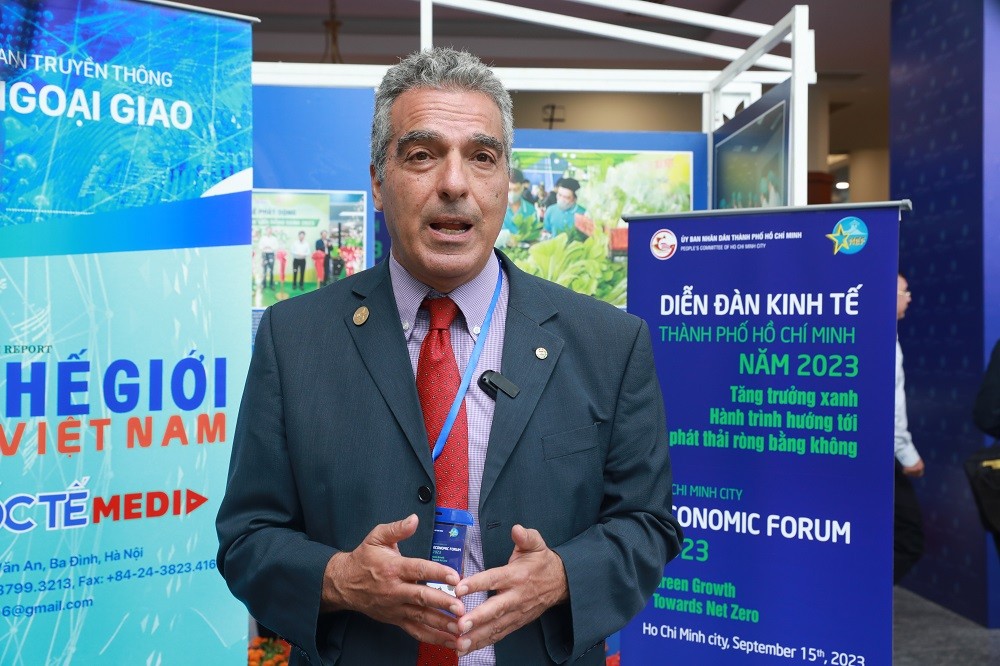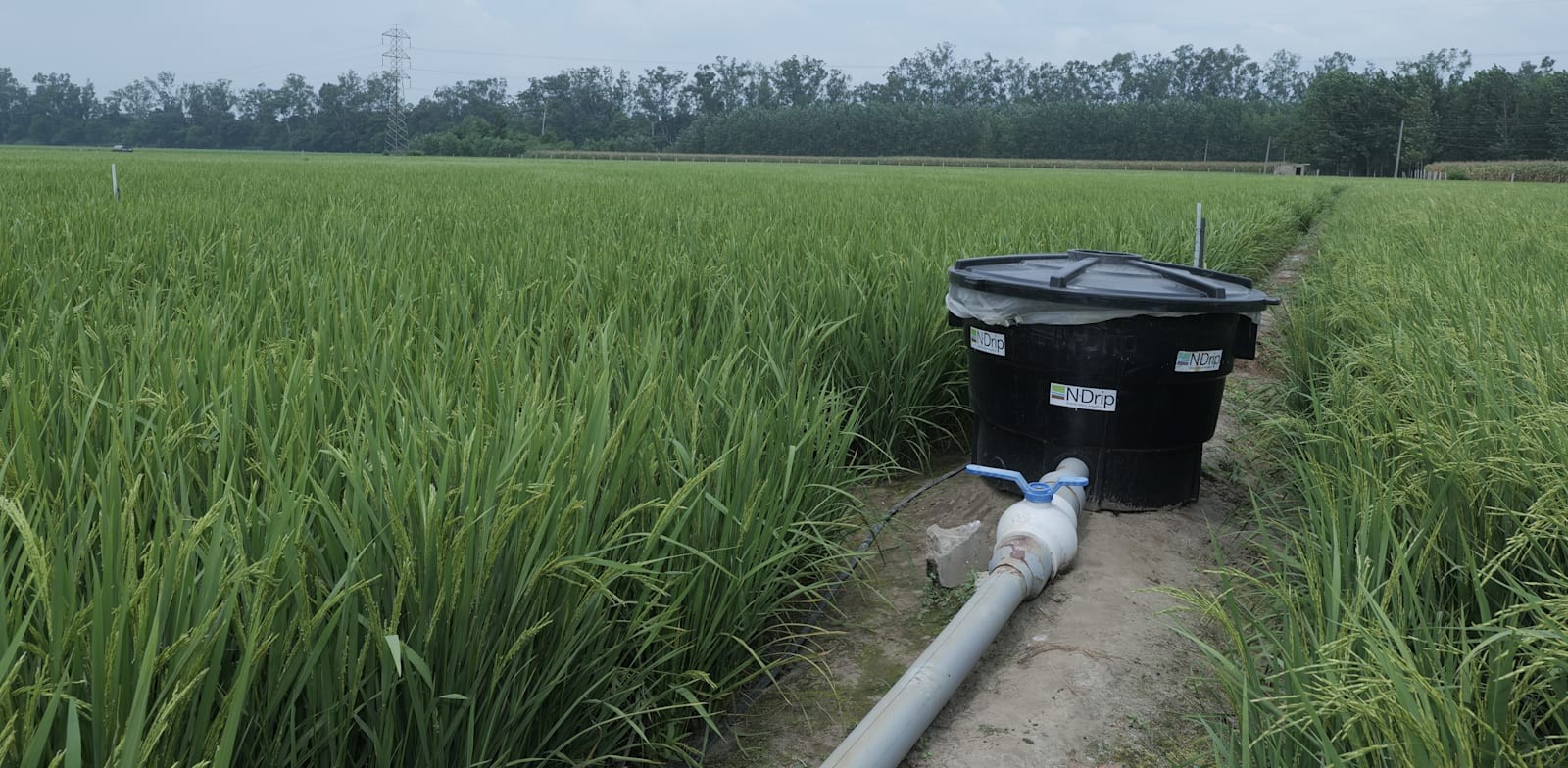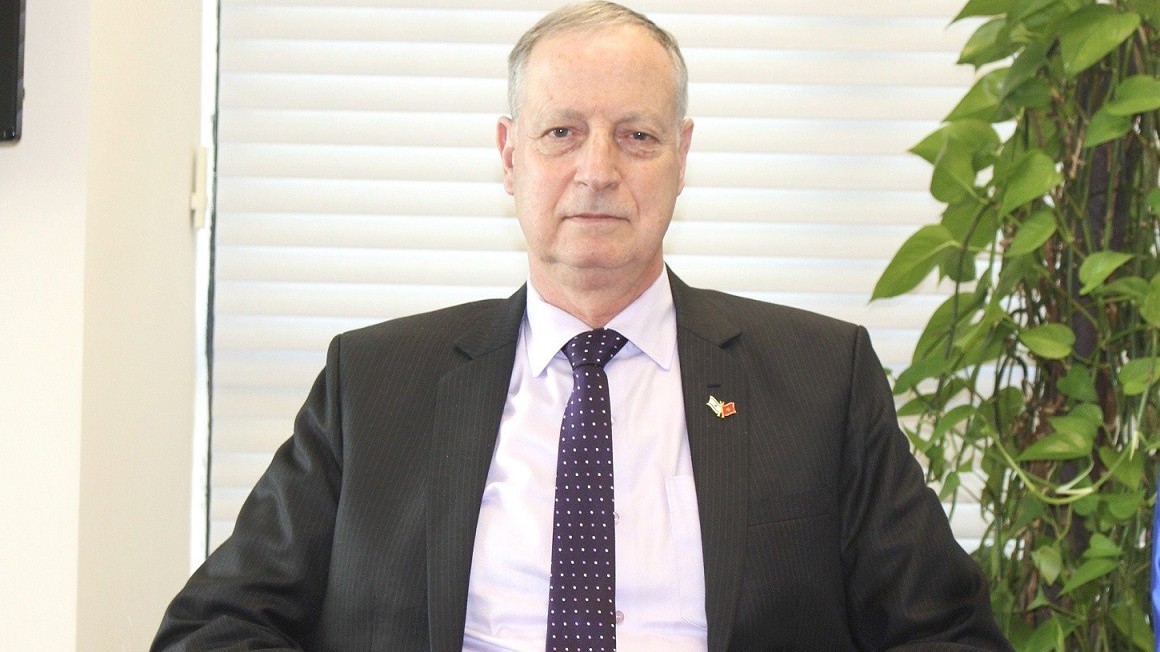
Vietnam can apply Israel's wastewater recycling model: Ambassador Gideon Behar
Latest
 |
| Ambassador, Special envoy on climate change and sustainability of Israel Gideon Behar (Photo: Ben Thanh) |
Israel is a country with very limited water resources. Could you please share about Israel's circular water saving model?
Israel is a very interesting water management model. Our model actually bases on 4-way stations. The first station is desalination absorb water. We actually desalinate about 70% of our drinking water which we get from the sea. After they are desalinated, they are transferred to the cities where they are mixed also with aquifer water, underground water, to improve the quality of the water. And they are used in the cities.
Now, the interesting thing is that after all of this water is being used, we collect them. And we actually purify or treat 95% of all the sewage water in Israel. And this is, I must tell you, a world record. No other country in the world is coming closer even to that. We wish that every country in the world would treat at least 95% of its water, if not 100%. After this water is treated and purified, it is used for agricultural purposes in Israel.
Actually, we irrigate our agriculture from that. With this water, we purify the sewage water on a very high standard, with very strict regulation, with a very strict system of pipelines that we use only for this water. We do not mix them with drinking water. And we use them for agriculture. And this is actually the way we make agriculture today in Israel.
Without this water coming from purified sewage, the agricultural amounts in Israel would be very small. I can also tell you that in Israel, water has a price. Everyone pays the same price for the water. And all the revenues that come from the water sales are reinvested only in the water infrastructure. So the water infrastructure is very good in Israel. And we suffer only from very few percent of water leaks or water loss.
Actually, water loss in Israel is minimal. It is only about 3 percent, which is another world record. Now, untreated sewage and water which is lost because of leaks or loss is actually greenhouse gases that were emitted for money, for nothing, and also money that we spend for nothing.
I can tell you also that in Israel, there is a great awareness for saving water. We are all trying to save water. We will not leave the hose open for a long time. We will take short showers. So water consumption per capita in Israel is the lowest in the developed world.
On April 10, the Israeli cabinet unanimously approved a plan to reduce greenhouse gases and increase energy efficiency to promote economic development. What has Israel done to reduce greenhouse gas emissions and minimize damage to the environment?
We just recently passed a law that indicates that we are in the process of passing a final law that will reduce greenhouse gases in Israel. We will become net zero in 2050, like Vietnam, and we will reduce emissions by 30 percent by 2030. This is at least the intention. We are increasing the share of renewable energy in Israel, especially solar energy.
We are moving very fast toward electric vehicles. We are closing down all the remaining coal facilitation that we have in Israel. So in two years' time, we hope we will not produce energy from coal anymore, but from natural gas and solar energy, and hopefully also we will phase out gas completely by 2050.
We are also working on an agreement with our neighbor, Jordan, to buy solar energy from Jordan, which is bigger than Israel and has much bigger places to build these solar installations. And so we will also get energy from Jordan.
We will sell Jordan, by the way, also 200 million cubic meters of desalinated water. So it's kind of a deal. We will buy solar energy from Jordan and sell Jordan desalinated water. There are also plans to reduce emissions from the sector of garbage, from landfills, and in agriculture. So we will reduce emissions also in the west sector.
 |
| Israeli agricultural technology company N-Drip. (Source: Globes) |
What is your opinion on the current situation of Vietnam’s water resources and the possibility of Vietnam’s applying Israeli methods?
I think that Vietnam should pay great attention to the issue of water. We see that there is a decline in the quantity and quality of water in Vietnam, especially in the Mekong River Delta and in other places. So this is an area to think about.
In my opinion, Vietnam can apply the Israeli model when it comes to purification of water. Sewage treatment and sewage purification are very important. And I mean, it's a pity to discharge all this sewage into nature, into rivers or lakes or the sea or just like that. Sewage is not garbage. We see sewage of the waste water, we see it as a resource.
And once we understood that this is a resource that we can use, we are using it and it's for our benefit. So I think that this can be also applied for Vietnam to see your waste water as a resource, not a problem, but a resource and to purify it.
Another thing that Vietnam can do, and is already doing, I know, is minimizing water loss in the water systems. As I told you before, we lose about 3% of our water because of water leaks.
In Vietnam, it is much higher. And it can very easily be done. I mean, it's not very complicated or sophisticated. It has to do with regulation. For instance, lowering the pressure of water during the night time when people do not need it. This reduces water loss.
Applying systems and ways to detect water loss. For instance, by putting sensors in the water pipes or by using satellites or drones to detect leaks and water loss in different parts of the water system and then come and repair them.
I think another interesting development in Israel which can be very interesting for Vietnam is the growing of rice with drip irrigation. In Israel, a company called Netafim has developed rice varieties that can grow on drip irrigation. It means that we do not need to grow rice in rice paddies anymore or in rice ponds, you know, to flood the area or to flood pools of water and to grow rice there. But there are possibilities also to grow rice in or by drip irrigation. It means that it will save much more water for Vietnam, big quantities of water.
And it will also reduce methane emissions that are coming today because of rice growth. So it will help Vietnam also achieve its targets of net zero emissions by 2050. And I think that it would be a very useful idea to test this system or this innovation here in Vietnam to see how it is working and how it can be applied on a large scale.
What do you think about the potential for cooperation between Israel and Vietnam in the field of water?
I think that there is a great potential. We are already cooperating a lot in the field of water between the two countries. Our embassy has arranged multiple seminars and webinars for businessmen from both countries to learn from one another and to expose Israeli technologies here in Vietnam.
There are already some Israeli companies that work here and do the transfer of know-how. And of course the technologies themselves. Our international aid agency, MASHAV, is also very active in Vietnam. And it is holding on a regular basis training either in Israel or Vietnam.
And there are numerous experts from Vietnam going to Israel either for training or for field visits to see what are the benefits of the Israeli model. We have also signed an agreement with the Mekong River Committee for the transfer of knowledge on water and water management.
There is also a trilateral cooperation on water between Israel and Vietnam and the United Kingdom. So all by all we see that there is already a long period of time of cooperation in the field of water. And we think that it can be expanded much, much, much beyond the situation today.
Just a few weeks ago we signed an agreement, a free trade agreement, between Vietnam and Israel. And we are very hopeful that this agreement will allow for more Israeli investment in Vietnam, for more technology transfer, for more business and trade between the two countries.
I know that there are also plans to open direct air flights between Vietnam and Israel. I think that once there is a direct air flight, it will help a lot of businessmen from both countries to traveland to meet and it will encourage this kind of cooperation.
We see our relationship with Vietnam as a very important one. Vietnam is a friendly country for Israel. Our relationships are excellent. Actually this year we are celebrating 30 years exactly of diplomatic ties between the two countries. And we are looking forward to more cooperation with Vietnam in every aspect, either it's renewable energy, it's agriculture, it's innovation, whether it's water or any other field of mutual interest.
And I think that together, Israel and Vietnam, we really can reach lots of good cooperation and development and make our world a better place.












